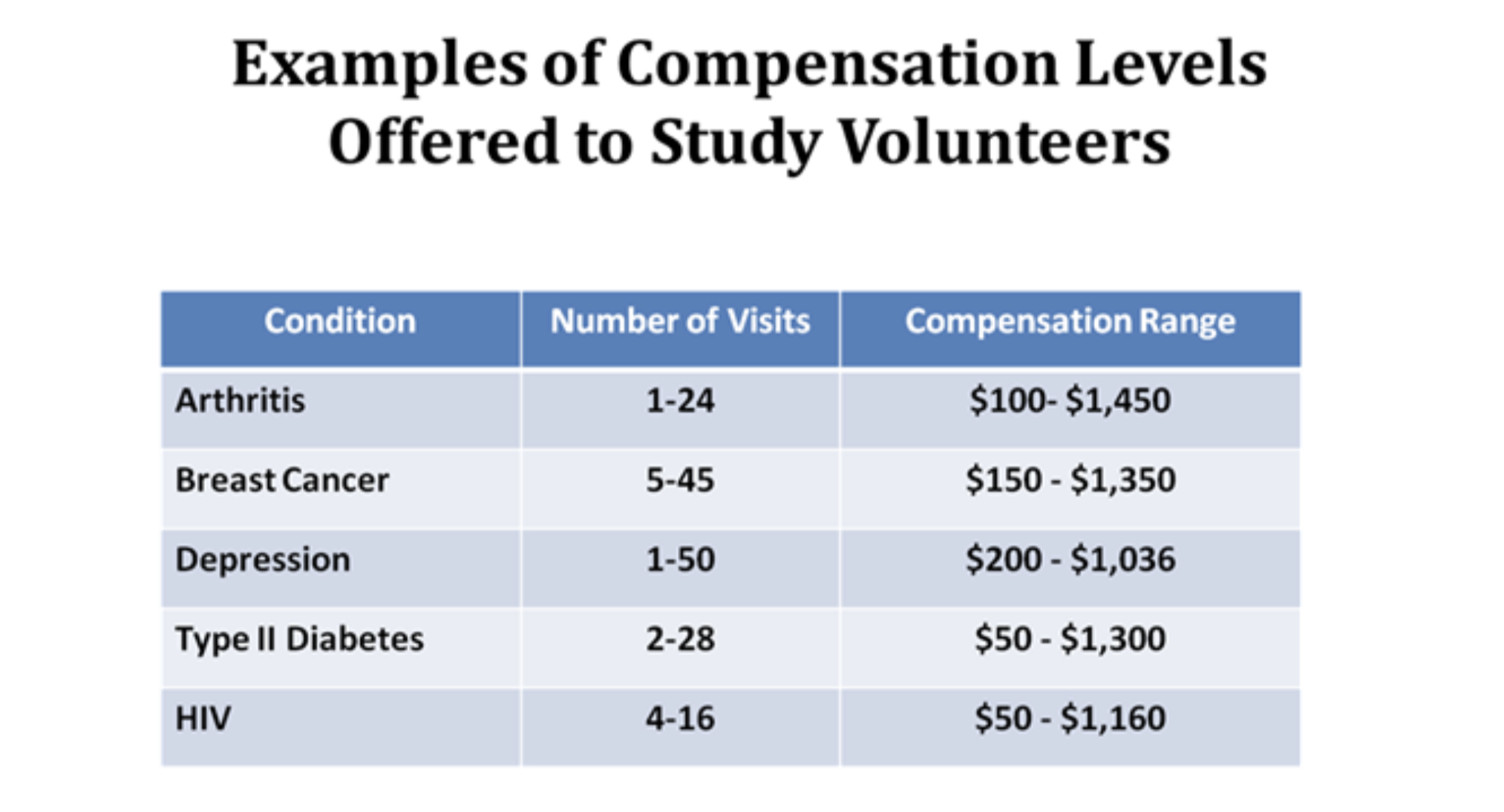Participating in a clinical trial can be a rewarding experience, offering access to specialized medical care and the opportunity to contribute to scientific progress.
What’s even more enticing is that some clinical trials offer compensation for your time and effort. In this article, we’ll explore paid clinical trials, why compensation for medical research is offered, and how to find these opportunities that align with your interests and health.
Understanding Paid Clinical Trial Opportunities
Before diving into the world of paid clinical trials, it’s essential to grasp why compensation is provided in some cases. Typically, compensation serves as a token of appreciation for the risks involved in the trial.
Clinical trials involve testing new treatments and therapies that have not yet received approval, so participants play a crucial role in advancing medical science.
Before enrolling in any clinical trial, participants are required to review and sign an informed consent form (ICF). This document outlines the potential benefits, risks, and side effects associated with the study.
It’s important to recognize that participation is voluntary, and individuals can withdraw at any time. However, the ICF serves as a valuable tool for comprehending the potential risks associated with the trial, making informed decisions a priority.
Getting paid for clinical trials: the variability in compensation

Compensation in clinical trials can vary significantly, depending on various factors. The phase of the trial plays a central role in determining payment rates.
Phase 1 trials, which investigate treatments that are less understood, tend to offer the highest compensation, averaging around $2,000. In contrast, Phase IV trials, focusing on post-approval research, typically offer lower compensation, averaging about $400.
Moreover, the therapeutic area being studied can impact payment rates. Trials related to cardiovascular disease, neurology, endocrine disorders, gastrointestinal conditions, and blood disorders often offer the highest compensation.
However, it’s crucial to remember that compensation is not merely handed out; participants are expected to provide detailed tracking of symptoms and side effects, as well as make periodic visits to the research site.
Clinical trials compensation can vary based on several factors:
- Specialization:
Highly specialized trials may offer higher compensation, particularly if expertise is required from participants. - Duration:
Longer trials tend to offer higher compensation to account for the extended time commitment. - Type of Project:
Trials that involve travel or overnight stays often provide more substantial compensation to cover related expenses. - Complexity:
The complexity of the trial and the level of involvement required can impact compensation rates.
How to Find Paid Clinical Trials

Finding paid clinical trials can be challenging due to strict advertising regulations and eligibility criteria. Many trials do not explicitly mention compensation in their listings, making it difficult to determine eligibility before the screening process. Here’s a guide on how to embark on your quest for paid clinical trial opportunities:
- Use a Personalized Search:
Start by using personalized clinical trial search tools to narrow down options. While these tools may not allow you to filter for paid trials, they help identify studies that align with your profile and needs. - Screening Process:
Keep in mind that most eligibility and compensation details are revealed during the screening process. Once you identify a trial that interests you, undergo the initial screening to determine your eligibility and gain insights into the compensation offered. - Consider the Benefits:
Even if a clinical trial doesn’t provide compensation, remember that you’re contributing to scientific progress and potentially gaining access to innovative treatments. Your participation is invaluable in advancing medical research and benefiting future generations.
Benefits of Participating in Clinical Trials
Joining a clinical trial can be a meaningful decision, offering several advantages:
- Access to Innovative Treatments:
Clinical trials often involve testing new medications or therapies. By participating, you might gain early access to cutting-edge treatments that could improve your health. - Contribution to Medical Advancements:
Your involvement directly contributes to the advancement of medical knowledge. Researchers rely on participants like you to gather crucial data that can lead to better healthcare practices. - Personalized Care:
Clinical trials typically involve close monitoring and personalized care plans, ensuring that your health is a top priority throughout the study. - Financial Compensation:
Many clinical trials offer compensation to participants. This compensation can vary based on the trial’s complexity, duration, and required commitment.
Safety Considerations: Are paid clinical trials safe?
Safety is paramount in paid medical studies. Before participating, it’s essential to understand the potential risks and inconveniences:
- Time Commitment:
Clinical trials can be time-consuming. Participants may need to attend multiple screening and follow-up sessions. Some trials even require overnight stays. - Restrictions:
You may encounter restrictions on daily activities, such as dietary limitations or abstinence from alcohol consumption. - Possible Side Effects:
New treatments can have unknown side effects. Be prepared for the possibility of experiencing unexpected reactions to the study intervention. - Informed Consent:
Researchers are required to obtain your informed consent before your participation. Take the time to thoroughly review the study’s details and ask questions to ensure you understand the risks and benefits.
Conclusion
In the realm of clinical trials, compensation can be a welcome incentive for participants, acknowledging the risks and efforts involved. However, it’s crucial to strike a balance between compensation, contribution to medical research, and safety of paid clinical trials. Research studies are essential for advancing healthcare and developing new treatments, and without willing participants, progress would be significantly hindered.
Before joining a clinical trial, potential participants should carefully review the informed consent form, ask questions, and weigh the potential benefits and risks. Participation in clinical trials is a noble endeavor that can contribute to the well-being of future generations and the advancement of scientific knowledge. Whether compensated or not, every participant plays a vital role in the pursuit of better healthcare solutions. So, if you’re considering joining a clinical trial, start your search today and be part of the progress in medical science.
Tips for Finding and Participating in Paid Clinical Trials from Home in 2024
- Research Reputable Trial Platforms:
Look for established online platforms or organizations that specialize in remote clinical trials. These platforms often list a variety of trials, including those for healthy volunteers. - Set Clear Expectations:
Understand that not all clinical trials offer monetary compensation, especially those focused on treatments for specific medical conditions. If your primary goal is payment, prioritize trials explicitly offering compensation. - Browse Multiple Trial Listings:
Explore different trial databases and listings to find the highest paid clinical trials that align with your profile and interests. Cast a wide net and consider various options. - Healthy Volunteer Trials:
Yoy can specifically search paid clinical trials for healthy volunteers designed for individuals without underlying medical conditions. These trials often offer compensation for your time and participation. - Review Trial Details:
Thoroughly read the descriptions of each trial, paying attention to compensation details, study requirements, and eligibility criteria. Ensure you qualify and are comfortable with the trial’s expectations. - Understand Payment Processes:
Familiarize yourself with how and when you will get paid for clinical trials. Some trials may provide payments at specific milestones, while others may offer a lump sum upon trial completion. - Safety Monitoring:
Paid research studies include regular health assessments and monitoring to detect any adverse effects or complications. Researchers closely track participants’ well-being and can intervene if safety concerns arise.




